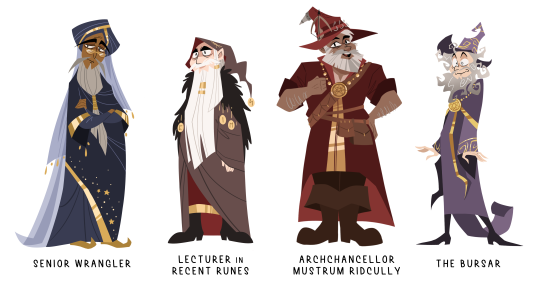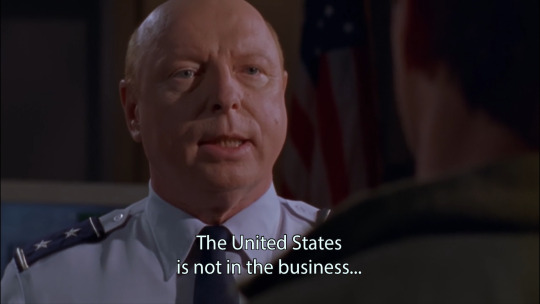genre, tech, science, feminism, literature, and the world.
Don't wanna be here? Send us removal request.
Text
“In Russian, Baba Yaga’s name is not capitalized. Indeed, it is not a name at all, but a description—“old lady yaga” or perhaps “scary old woman.” There is often more than one Baba Yaga in a story, and thus we should really say “a Baba Yaga,” “the Baba Yaga.” We do so in these tales when a story would otherwise be confusing. We have continued the western tradition of capitalizing Baba Yaga, since the words cannot be translated and have no other meaning in English (aside perhaps from the pleasant associations of a rum baba). There is no graceful way to put the name in the plural in English, and in Russian tales multiple iterations of Baba Yaga never appear at the same time, only in sequence: Baba Yaga sisters or cousins talk about one another, or send travelers along to one another, but they do not live together. The first-person pronoun “I” in Russian, ‘ia,’ is also uncapitalized. In some tales our witch is called only “Yaga.” A few tales refer to her as “Yagishna,” a patronymic form suggesting that she is Yaga’s daughter rather than Yaga herself. (That in turn suggests that Baba Yaga reproduces parthenogenetically, and some scholars agree that she does.) The lack of capitalization in every published Russian folktale also hints at Baba Yaga’s status as a type rather than an individual, a paradigmatic mean or frightening old woman. This description in place of a name, too, could suggest that it was once a euphemism for another name or term, too holy or frightening to be spoken, and therefore now long forgotten.”
— Sibelan Forrester, from her introduction to Baba Yaga: The Wild Witch of the East in Russian Fairy Tales
41K notes
·
View notes
Photo
I just look at these pictures and imagine trying to keep these rooms clean and want to cry







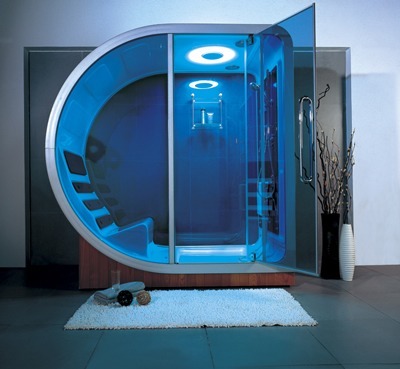

Rich people showers
1M notes
·
View notes
Text
After shoving Hansel in the oven, the witch turns to Gretel - who is currently fending the witch off with a gingerbread chair - and says:
“I can’t believe you thought a trail of breadcrumbs would save you. I mean, honestly, this is a forest! It’s full of animals. Honestly, the very idea that a dumb shit like you thought you could get the better of me is absurd.”
Gretel hits her in the face with said chair. To be fair to the witch, she takes the chairshot like a champ.
“Ow!”
“Did you know,” says Gretel, “that crows are capable of facial recognition?”
“Eh?” Says the witch, clambering to her feet and pulling a candy cane sledgehammer off the wall. “What’s that got to do with anything?”
“Not only that,” Gretel continues, “but they can remember both friends and enemies. And they’ll often follow people they remember as friends.”
The two fence with their sugared weapons for a moment, before the witch knocks the chair out of Gretel’s hands.
“Enough with the bird facts! Honestly, this whole attempted escape has been utter clownshoes. Get in the fucking oven!”
She seizes Gretel by the collar. Gretel immediately sandbags, letting her whole body go limp. This eminently practical defense forces the witch to try and deadlift her. Which is hard, as the witch often skips leg day.
“For example,” Gretel says, as the witch struggles and grunts, “if you feed crows a lot of breadcrumbs, they’ll probably start to see you as a friend and follow you in the hope of more food.”
The witch stops. Outside, she hears the thunder of wings.
“They’ll even bring you shiny things they find as presents!” Says Gretel, as a corner of the gingerbread ceiling is suddenly cut away by a large crow with a knife in its mouth.
“Oh shitballs.” Says the witch, as the crows descend. “I hope you know this is a great unkindness.”
“Technically,” Says Gretel, “It’s a murder.”
84K notes
·
View notes
Photo


Ivanova knows a compliment when she hears one.
592 notes
·
View notes
Text
Y'know, some people do have a strong crying response to stress, and they might cry (even against their own will) when faced with an upsetting situation and that doesnt mean they are "gaslighting" or "manipulating" you.
There are people who use crying as a manipulation tactic? Absolutely. But that doesn't mean that every person that cries during a heated argument is trying to get under your skin. They have their own emotions and issues, and frankly, not everything other people do is a personal attack on you.
163K notes
·
View notes
Text
Btw, that idea that privilege makes you morally evil and suffering makes you morally good is just repackaged versions of the Christian concepts of the evils of luxury and the holiness of martyrdom. Hope this helps!
47K notes
·
View notes
Text
"these researchers published a paper on something that literally any of us could have told you 🙄" ok well my supervisors wont let me write something in my thesis unless I can back it up with a citation so maybe it's a good thing that they're amplifying your voice to the scientific community in a way that prevents people from writing off your experiences as annecdotal evidence
117K notes
·
View notes
Text
Theres one line in the books (i forget where, i gave my copies back to the library) where Murderbot says something along the lines of "ARTs reply doesnt translate to human words, but trust me that it was very rude"
And it has convinced me that they cuss each other out using archaic malware attacks
Consider:

Or possibly:

Or perhaps even:

3K notes
·
View notes
Text

Let's have the conversation about UBI.
Let the actual data and facts end the bad faith arguments.
57K notes
·
View notes
Text
So one of the things I like about Star Trek: Deep Space Nine, which I think is somewhat underappreciated in the audience because it clashes hard with the utopic vision of the future, is that the Federation is in many ways still systemically and culturally ableist.
I think this is explored best in S02E06's "Melora," obviously.

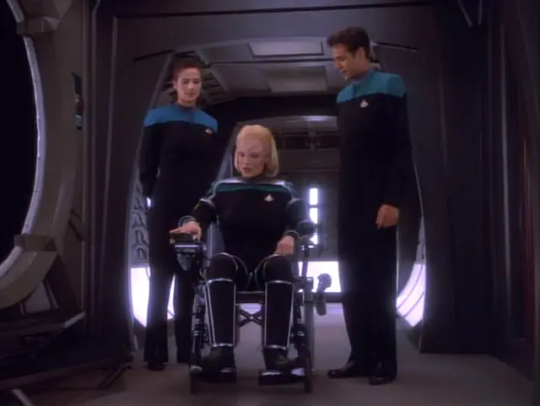
This episode starts off with Dax being shocked that the replicator contained a schematic for a wheelchair, because no one has needed one in three hundred years. Bashir answers that no no no lol, Federation replicators in fact cannot make wheelchairs based on their built-in libraries, and that the wheelchair is a schematic that their incoming wheelchair user coworker sent over to have replicated for her on arrival.
The rest of the episode explores how this utopic vision of the future that the difficult-to-accommodate disabled are not a part of has absolutely de-normalized the cultural concepts and accommodations surrounding some disabilities, thus creating complex and seemingly anachronistic institutionalist-era realities in the space future.
This is, to me, deeply interesting because it highlights a very real conversation around pursuing cures against pursuing accommodation.
It's basically acknowledging the threat of the Gattica style shit currently engaged in by dudes like Elon Musk and these freaks

(for those who don't recognize them, these are weird pro-natalist yuppies who claim they've done shit like genetically engineer their kids for high IQs, a scentifically impossible thing. they are, unsurprisingly, very racist but in a SoCal-Berkeley way.)
becoming so normalized in society that we effectively engineer out the majority of "defects." Everybody starts off with a happy healthy life as defined not through accommodation and infinite diversity in infinite combinations, but through the elimination of variation that would necessitate different cultural practices, different architecture, different understandings of life worthy of life, blah blah blah.
It's not "in the brilliant shining future nobody has to be disabled," it's "in the brilliant shining future the disabled aren't allowed to exist, and we don't have to think about them" lol.
But! Geordi LaForge!
Well, Geordi is born blind in a context where blindness can be perfectly accommodated, debatably even cured, via his wundervisor and / or surgically implanted eyes. In fact, in the movies, which do not exist sorry, Geordi gets them eyes stuck in and in so doing even loses the cultural signifier of his blindness, as well as situational considerations of blindness.
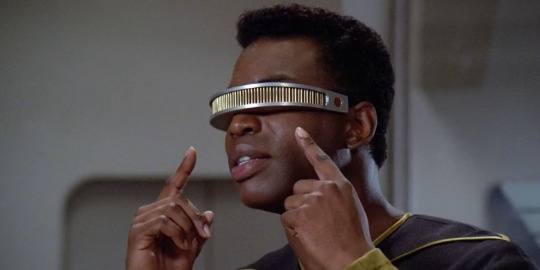
Further, Geordi is in this unfortunate weird space a lot of disabled characters in science fiction are, where his prosthesis is considered cool enough that it passes some kind of ableist vibe check wherein the character is no longer necessarily received as "disabled" by the audience. It's a cool cyberpunk thing, and thus loses its audience association with disability in many ways, ala Adam Jensen's sword arms or the unexplored nature of voluntarily cutting off one's limbs to replace them with robot parts in Cyberpunk 2077.
Geordi "can do things," he just "has to do things a little differently." The "a little differently" here is defined as "wearing a thing on his face" and not a different process or method. We never see how Geordi lays out his quarters or prepares his uniform, tools, whatever in a way that makes it all more accessible for him; he readily assume the first thing he does in the morning is plug his visor in. Glasses.
It's a fun cosplay idea in a way a wheelchair isn't.

The thing is, when Geordi is without his visor, he's fucked.
I don't just mean the episode where he's trapped in a island with a Cardassian or whatever, I mean on the fucking Enterprise. Say they're in a crisis, he falls over, wangs his noggin on a console and breaks his visor. Look at the open layouts with no handrails leading anywhere, no braille or layout signage posted, nothin'.

How the fuck is he going to find his way to the turbolift?


These are not accessible environments for a blind bloke. These are accessible environments for a sighted bloke wearing glasses.
The thing to consider as well is, we know Geordi's blindness is absolute. Blindness in real life is pretty diverse, actually, and many blind people do have some vision. Not Geordi. So, all the lights that communicate where to go in a crisis mean fuck all to him.
And, considering how often the Enterprise is in crisis, crew members are cut off from each other or the ship, the practical realities Geordi has to deal with on away missions that are simply never accommodated - it becomes apparent that Geordi is considered effectively the same as any sighted crew member.
His disability accommodation is individual and his responsibility. Nothing is provided by Starfleet except, perhaps, new visors and free visits to Beverly.
The same criticism exists for my man Hemmer,
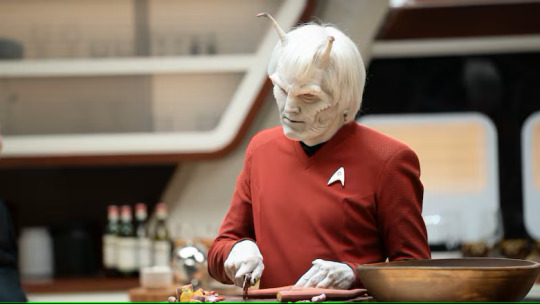
who is played by blind actor Bruce Horak, yes, but who exists in a similar state to Geordi. I doubt they considered Mr. Horak a consultant on blindness and how a blind crew member would work in their series, because again, his blindness is accommodated for by magical future thing that doesn't fucking exist. In this case, psychic senses or something (idk I've never watched nuTrek sober).
If you look at the environments he's in, or the situations he deals with on away missions, sans those Daredevilian supersenses he'd be shit out of luck.
They're so adverse to giving blind characters so much as a cane.
I'm not saying the inclusion of blind characters is bad or that we should not engage in these fantasies of disabled characters being able to live and work equally to able-bodied characters without the need for accommodation, necessarily. I'm certainly not saying every blind character should have a sighted support following them around or a dog or whatever. My criticism is not of the blind characters' individual accommodations not being up to my arbitrary standard as a sighted viewer lol.
What I am instead attempting to hightlight here is that the shows seem adverse to engaging in disabled / accommodative environmental design or in the more complex, social realities of disability, and that's something that the episode "Melora," the wheelchair user episode this post is about lol, addresses in depth.
Julian is a future space doctor who doesn't know how to comfortably talk to someone in a chair. That only happens in a universe where doctors don't encounter wheelchairs in their professional lives. That's a reality brought about specifically by the comfortable eugenicist realities of the future, where although due to a war the Federation draws the line at "enhanced" individuals, it obviously voluntarily engages in liberal eugenics to the effect of eliminating disabled life in many meaningful forms. Its society, where doctors seem to need an aide like this to do their jobs properly:
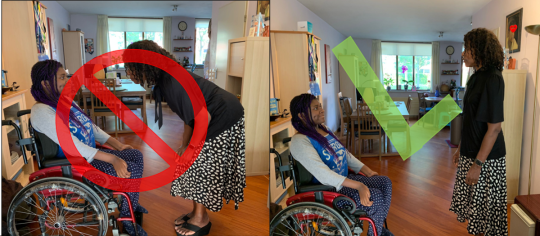
And idk! I think that's neat. I think that's a powerful flaw in the utopic vision of the future that Roddenberry and the others probably didn't intend originally, and that DS9, commendably, attempts to explore.
Especially because Julian was a lil autistic boy who was forcibly cured through similar treatment, and correctly identifies that this means the him who existed before was drastically altered for his parents' fear of actually accommodating him.
anyway this post was brought out of me by some dickhead saying Melora "breaks the setting" for them lol. bro they fought a eugenics war, they definitely didn't come out of that culturally unchanged. you're just scared of wheelchairs. fuck u
3K notes
·
View notes
Text
girls just wanna have fun (hide away in their bedrooms with piles of books until further notice)
6K notes
·
View notes
Text
‘Twas brillig, and the slithy toves A stately pleasure-dome decreed. And what rough beast, its hour come round at last, Could frame thy fearful symmetry?
9K notes
·
View notes
Text
my sewing machine does exactly one thing, and yet every single time I try to sew something with it I feel like I've put my baby in the pelican's mouth. over and over again.
6K notes
·
View notes
